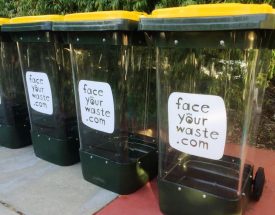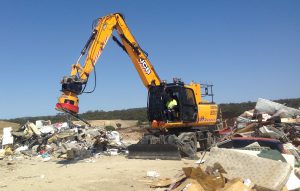From educating residents about the amount of waste they produce to maximising e-waste recycling, local government initiatives across Australia are diverting waste from landfill.
Since Monday, see-through bins have started to appear on the kerbs across seven council areas in northern Perth as part of a novel initiative to raise community awareness about waste, recycling and sustainability.
Günther Hoppe, acting CEO of Mindarie Regional Council, Western Australia’s largest waste management authority, says that with an increasing amount of waste going to landfill every year the campaign aims to encourage people to think about the waste they’re producing.
“We talk a lot about recycling and energy recovery but we see less activity around avoiding, reusing and reducing the amount of waste that we produce, so that’s where the Face your Waste campaign really sits,” he told Government News.
The campaign, which has been in development for the past eight months, is predicated on research showing that once waste is put into the bin it goes out of sight and out of mind, he said. “That’s where the novelty of these clear bins came from, they’re to make our waste visible and encourage people to engage with it.”
The initiative, which will see 20 clear bins rotate across the seven council areas, aims to stimulate a discussion among residents about what gets dumped, the level of packaging that comes with their purchases, as well as consumption and sustainability, Mr Hoppe said.

“It’s about challenge people’s thinking on whether they can reuse something rather than throwing it out and buying a new one,” he said.
Initially the bins will roll out across Mindarie’s seven council member areas but will be made available for other councils who want to utilise them, Mr Hoppe said.
“They’re not designed to replace our normal bins over the long-term but we’re happy to keep them in circulation creating conversation for as long as possible.”
In terms of gauging the campaign’s success, Mr Hoppe said the council would be measuring household waste production before and after the trial.
Keeping organics out of landfill
Like Mindarie, the City of Greater Bendigo is putting a focus on education and community awareness raising in its waste initiatives, following an audit last year that showed 22 per cent of general waste bins were being filled with organic waste.
Since mid-March, the council has been trialling an organic waste collection with 16 local food businesses within the CBD with the goal of keeping organic waste out of landfill.
It follows the council’s successful introduction of a fortnightly domestic organic waste collection in September, which is now servicing 38,000 households, according to Bridgette McDougall, resource recovery development coordinator at the City of Greater Bendigo.
“We have these systems in place that collect organics from households but so much more is generated by businesses that handle food, so we thought let’s test the system and see what we can capture… and we had a few businesses out there that really wanted us to service them,” Ms McDougall told Government News.
Under the trial, which will run for at least four months, each participating business has been given two 140-litre organics bins that are collected twice a week.
Whereas previously the organics from those businesses was sent to landfill, it’s now going to be processed and turned into compost, she said.
The council will gather data on the volume of organics being collected and the difference the new service is making.
“We’ll also survey the businesses at the end of the trial to ask about positive outcomes, any barriers, and what they would like to see from us,” said Ms McDougall.
Already two of the participating businesses have reported getting rid of one or two of their general waste bins as a result of the new organics collection.
The council is also running a trial of the organic’s collection with about 40 schools, which is being reinforced with visits from its education officers as well as resources and educational materials it produced.
“We’re really ramping it our community education, whether that’s through businesses, schools or to the general community, using social media, mass media, advertising… we’re really focussing on just getting that material into the right bin so it can be processed into something else rather than just sitting in a whole in the ground,” she said.
Tackling electronic waste
With e-waste posing a significant problem for authorities, especially when not disposed of properly, several councils are initiating new approaches to reduce the amount of electronics that end up in landfill.
NSW’s Central Coast Council reports that its residents can now recycle their e-waste, following its engagement of a new contractor in January, which uses Swiss technology that breaks down e-waste items such as smart phones, laptops and flat panel displays.
Where previously the council was required to fund the recycling of e-waste items, Mayor Jane Smith said that under the arrangement with Toxfree, it is now being paid, with the funds going towards community services.
“With Toxfree more of the items’ parts are also being recycled including circuit boards, plastic and metals, reducing the impact on our landfills.”
Residents can now drop off up to 15 household e-waste items at the council’s waste management facilities, she said.

Last month, the council announced another strategy to reduce the amount of waste directed to landfill with the purchase of a specialised materials handling excavator.
The excavator, funded through an EPA grant, is sorting through household waste at a council waste management facility and recovering scrap metal, mattresses and other recyclable products.
Since it started operating in September last year a number of environmental, social and economic benefits had been realised, according to Andrew Pearce, the council’s waste services unit manager.
In the first five months of operation, the excavator successfully recovered more than 1,000 tonnes of scrap metal and 1,400 mattresses, he said.
Comment below to have your say on this story.
If you have a news story or tip-off, get in touch at editorial@governmentnews.com.au.
Sign up to the Government News newsletter.




Plastic Waste
I wonder if concern is misplaced and mismanaged with regard to plastic waste when we (the business economy) allows products that do not have to be made of plastic continue to be manufactured with no thought of future disposal cost and environmental damage, specifically I refer to plastic water tanks. These are sold on the false claim that they last forever when steel tanks ( with a good quality sleeve) is a better choice for the environment. The plastic
water tanks sold are not using recycled plastic so the amount of plastic being created dwarfs anything Coles can create.
Why not introduce legislation to outlaw unnecessary manufacture and reward industry that is producing environmentally favourable products. It’s the only way. Politically we can do better….still waiting for a government that can represent the people…96% of people want renewables…but we just shake our heads, wring our hands and cry. Woe is us.